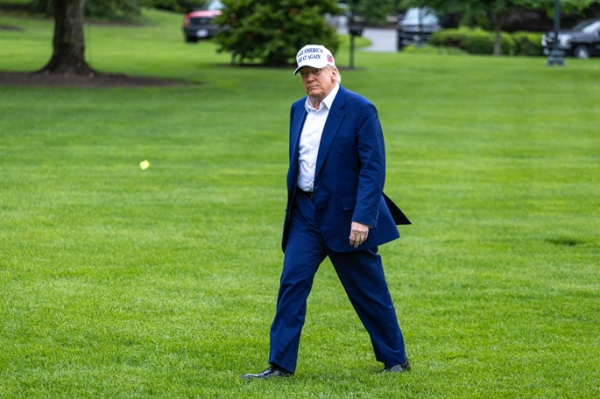German wine region already excited, bracing for potential Trump trip

Germany is already preparing for a potential US presidential visit, even though it hasn't yet been scheduled, with officials dusting off recipes and considering conversational topics.
After all, Chancellor Friedrich Merz has already sent out an invitation, saying he will travel to the idyllic Palatinate region to host US President Donald Trump – an area known for its wines.
Trump is unlikely to be impressed by the region's fine Rieslings, as it is well known that the US president is a teetotaler, preferring to consume numerous Diet Cokes during the day. But Merz might like a glass of the well known local wine and the prospect of bringing Trump to the place where his ancestors came from might draw the Republican to accept.
"I have invited him to come to Germany and visit us in his hometown of Bad Dürkheim," Merz said.
The chancellor would travel there with him for a visit of great symbolic significance, for Germany, for trans-Atlantic relations as well as for the personal relationship between the two politicians.
The invitation, amid global tensions, is friendly, but not without calculation.
Merz knows the Palatinate from his military service, Trump knows it – if at all – only from stories.
His paternal grandparents came from Kallstadt in the district of Bad Dürkheim before they emigrated at the end of the 19th century.
Meanwhile in the area itself, known as the Wine Route, locals are fairly relaxed about the possible visit by such a celebrity.
Kallstadt's mayor, Thomas Jaworek, is matter of fact about the possible visit. "I know nothing about any current plans," he says. Sure, a trip is conceivable but – ever practical – he notes that the former Trump houses on Freinsheimer Straße are now privately owned.
"If we go there, the owners would be the first people we ask," says Jaworek.
He would show the US president the "pretty wine-growing village" and take him to the church where Trump's grandparents were baptized. "I don't know if that means anything to him," says Jaworek.
If it comes to a chat, the mayor would like to talk to Trump about sustainability – especially since Kallstadt, with its Strategy 2030, is a model community in the Palatinate Forest Biosphere Reserve.
The political dimension of such a visit is difficult to grasp, says David Sirakov, a political scientist. He sees potential for symbolic politics, saying any visit could have an impact "if the personal relationship between the chancellor and the president develops."
But Sirakov, director of the Atlantic Academy Rhineland-Palatinate, notes that with Trump in particular, it's questionable whether "soft factors" such as places of origin or family history have any political relevance.
"He appreciates clear statements and media-effective appearances," says Sirakov. Flower beds and village churches – not so much.
US foreign policy under Trump is characterized by transactional thinking, says Sirakov, with less about a community of values, and more weighing up of interests.
Germany must anticipate this – without currying favour. It is a balancing act: there should be no German appeasement policy, but European realism, he says, firmly.
The region is sorely worried about the tariffs threatened by Trump, which would be a severe test for the Rhineland-Palatinate economy.
Meanwhile a partial withdrawal of US soldiers from the Ramstein air base – according to plans not implemented in 2020 – is also worrying to locals.
Ramstein, also in the state, serves as the headquarters for the United States Air Forces in Europe – Air Forces Africa (USAFE-AFAFRICA) and NATO Allied Air Command (AIRCOM). It plays a key role in supporting military operations, particularly those deploying to Eastern Europe and Africa.
Losing it would have serious consequences for the region. "The economic power of the US military presence can be estimated at more than $2 billion per fiscal year," says Ralf Hechler, mayor of the municipality of Ramstein near the base – including wages, rents and contracts for local companies.
"If Trump lands in Ramstein, I would of course be happy to meet him," says Hechler. He has met Merz personally, he says. "And he knows Ramstein because he also served in the German Armed Forces in Kusel and Zweibrücken."
A meeting with a mayor is probably not a priority for Trump. "But it would be important to improve German-American relations," says Hechler. Sure he says, you have to put up with a few things in long-standing friendships. "But you also have to nurture and cultivate them from time to time."
The Rhineland-Palatinate state government notes that Kallstadt is home to the ancestors of both the Trump family and the Heinz family, known worldwide for Heinz Ketchup.
They fled the bitter poverty of the Palatinate to the US in search of a better life and both families founded very successful companies.
"This shows that successful integration can make an immigration country strong." Meanwhile state premier Alexander Schweitzer would take Trump to see Hambach Castle, the cradle of democracy. "He is also happy to offer his services as a Palatinate German/English translator."
- Germany
- Trump
Source: www.dailyfinland.fi
